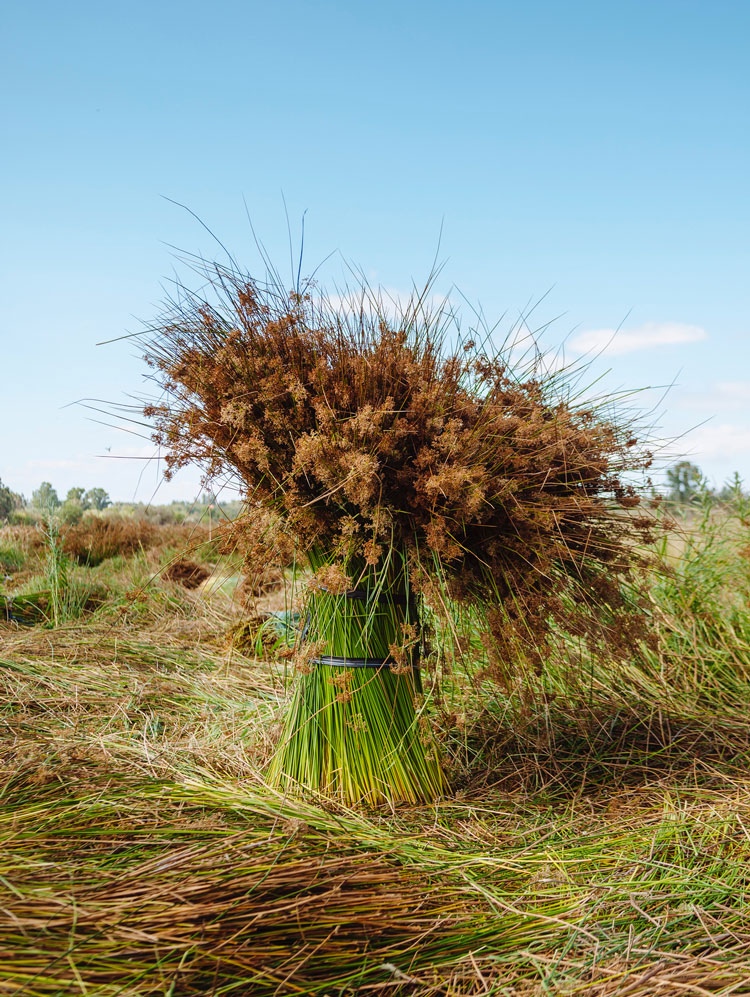TOINO ABEL takes a modern approach to basketry. We bring together an in-house designed collection with a unique savoir-faire while merging nature, design, and folk culture.
TOINO ABEL was founded by Nuno Henriques, who has developed an interest in handwork over the past years. Nuno uses his passion for this almost lost craft to drive forward a tradition in new ways. Nuno started TOINO ABEL in 2010 in Berlin and moved to the Portuguese countryside in 2013 to work alongside locals with the old remaining craftspeople.
Rescuing a Tradition
TOINO ABEL has rescued the ancient craft of reed basket making in Portugal.We acted at a vital time when artisans were few and old. Without them, this craft was lost. We acted out of love and we still do.
We have learned this technique side by side the remaining weavers. Gradually, we have refined its process and elevated the quality of every single step. Nowadays we are proud to realize that our bags have unparalleled craftsmanship.
A Long Heritage Carried by
a New Generation of Craftspeople
This ancient craft has been in the same family for five generations, interrupted only by the ‘baby boomer’ generation. Although we don’t know its roots, over time our bags became an icon of Portuguese tradition.
We are now a small but passionate team between their twenties and forties working with the very best crafters. Being crafters ourselves we are proud to bring this tradition forward as we feel a sense of responsibility for its history, process and balance with nature.
Read a personal letter, written by Nuno at the beginning of TOINO ABEL
Weaving as Breathing
Once you have understood how our bags are made, you will look at them through different eyes. From day one we wanted to show how our bags are made. So we started with a regular Sony Cyber-shot, documenting Cidália and Emília, on their loom space, with more than a few cobwebs and a hung calendar forgotten in time. Since then many journalists and photographers passed by our village and helped us spread the word.
In 2017 TOINO ABEL commissioned artist Dinis Santos to document our process through his lenses. It took a whole year as some of our tasks are seasonal or performed once a year. The result was a 12-minute documentary, with no music, no voice nor interview. We would like to invite you to watch it here and visit Dini’s great work here.
savoir faire with Today’s values
At Toino Abel, we don't believe in a business model based on cheap labor. If this craft alone is not enough to pay decent wages perhaps it is not worth doing it.
Declared work means social security, insurance, fixed-hours, tax-paying. Taxes allow access to universal health care as in Portugal's case or paid retirement when we grow too old to work.
Undeclared work means all the opposite of this.
Look at Cidália. Cidália was the first artisan I got to know and the one I visited the most. She worked for my great-aunt. (In this craft, you have houses that employ real artisans). I love her because she is so down to earth.
Cidália is now old, and she was already old ten years ago when I started TOINO ABEL. So I was coming from throwing the garbage when I saw Cidália walking down the street. She looked almost blind as she was trying to hold against the wall while walking. The road doesn't have sidewalks, although the elderly move slowly and cars drive at criminal speeds.
Nobody gives her a job because she is old and can no longer weave. She deserves to rest and get a decent paid retirement for her life's work. But no. She was always undeclared.
In Portugal, this is a usual practice. For some reason, we are a poor country. Please think who is paying the cost of the craft you buy - if you are not the one paying for it.
HUMAN nature MutualitY
Sustainability naturally also means supporting nature, its resources, and its cycles. Our primary material grows wild, every year in a slightly different location. No human action is required, and no pesticides, fertilizers, or pollutants are used. Almost our entire process does not even use electricity. We only use vegetable-tanned leather and ecological-certified cotton. Most of our production waste is decomposed in our garden, a few steps from our workshop. We use no varnish.
TOINO ABEL moves in the analog direction, a hard way, country-side based, providing the depopulated countryside with an activity that nurtures its community. We honor a long heritage by making it live and actual.
Design and Innovation
With a female designer at the helm, we bring our intuition and lived experience hand to hand with a unique savoir-faire to create an original and beautiful collection. Creative director Sara Miller joined the label in 2016. With a Bachelor in Fashion Design from CITEX in Oporto, Sara has worked in fashion houses for 15 years. At TOINO ABEL she has designed a collection that pays tribute to textile history and that magically foresees today’s trends.
We are always seeking like-minded people to join the journey. TOINO ABEL has done collaborations with artists like Paco Ortí in an interchange program between Portugal and Catalonia, organised by Arte Próxima. Together with Spanish fashion brand Ailanto, TOINO ABEL produced the accessories for its SS16 fashion show presented at Madrid Fashion Week. Recently we have done a collaboration with the very talented REALITY STUDIO - breaking the boundaries of what was done so far.








